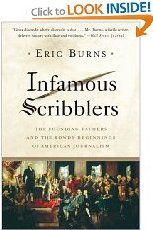At times the abuse came in torrents, with the republican press referring to him variously as “a gambler, a cheapskate, a horsebeater, a dictator, and a most horrid swearer and blasphemer.” He was labeled “treacherous,” “mischievous,” and “inefficient.” He was said to favor “stately journeying through the American continent in search of personal incense” and to enjoy “ostentatious professions of piety.” he was, appearances notwithstanding, a “frail mortal”; no less was he “a spoiled child, despotic,” “a tyrannical monster.” It is a collection of terms that does not come readily to mind these days when the subject is George Washington.
A few months ago, Blue Collar Muse (aka Ken Marrero) recommended a book to me, Infamous Scribblers: The Founding Fathers and the Rowdy Beginnings of American Journalism by Eric Burns. I’ve been dabbling with it off and on for several months. It is a fascinating story – or rather a number of fascinating stories. Burns book is aptly subtitled, “The Founding Fathers and the Rowdy Beginnings of American journalism.” His book is divided into three parts and 21 chapters.
Part One is the history of the earliest colonial newspapers and includes an account of the founding of the 4th newspaper in colonies by James Franklin in Boston in 1721 (where his younger brother Benjamin later served as an apprentice) and the famous Zenger trial in 1735 in which the Royal Governor of New York attempted to suppress a newspaper which he found annoying and embarrassing.
Part Two traces the role of journalism in both forming, reporting, and inciting American opinion during the period 1750-1775, leading up to the rebellion of the colonies against the British government. There are fascinating stories about newspapermen and pamphleteers in Boston and New York, including Sam Adams (and his cousin, John – an attorney who occasionally wrote for the papers) and Thomas Paine.
Part Three (the Tumult of Peace) covers the violent, scurrilous, and rowdy period of American journalism from 1789 to 1800 when rival newspapers were founded and supported by Alexander Hamilton and Thomas Jefferson. The newspapers were not used simply to promote the political ideas of their sponsors, but rapidly descended into character assassination and scandal-mongering. The scandals of Hamilton and Jefferson, though private, were quite real. Hamilton was caught in an adulterous affair, and Jefferson’s illegitmate children by his slave Sally Hemmings were a badly kept secret. The newspapermen were at first John Fenno (backed by Hamilton) and Philip Freneau (backed by Jefferson). They were succeeded by James Callender, Benjamin Franklin Bache (Ben’s grandson) and William Cobbett – all three scandal mongers who launched over-the-top attacks almost without ceasing.
The rowdy journalism of the 1790’s is what led to the Alien & Sedition laws and the prosecution and shuttering of newspapers by the Adams administration for “undermining the US government.” Adams later admitted it had been a huge mistake.
Burns’ subject is broad and he’s really telling multiple tales about three very different historical eras, but there is a great deal of commonality in the nature of journalism. Rowdy is an apt word. The book as a whole is a useful corrective to those who think the quality of American journalism has declined. Burns’ account shows that it has simply returned to its roots.
